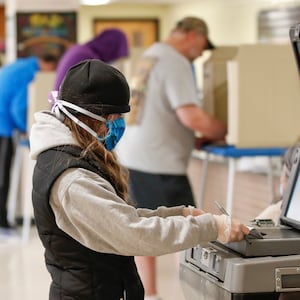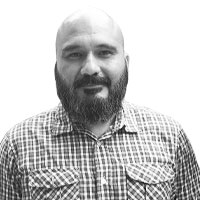Since early March, Paula Gomez has taken several precautions to ward off the coronavirus. Among them: The 74-year-old Cuban-American instructs her two sons and her son-in-law, all of whom work as delivery drivers for local pharmacies, to take off their shoes before entering her two-bedroom apartment in Hialeah, Florida.
“Then, they have to wash their hands in the kitchen sink and I make them sit on the dining room table while I am in the living room,” Gomez told The Daily Beast. “In the past three weeks, I’ve only gone out once. I went grocery shopping with my daughter. When we got back, she made me take a shower.”
In a telephone interview, Gomez ticked off several ailments, including high blood pressure, implants in both knees, and a chronic respiratory disease. She is prescribed daily doses of oxygen and albuterol, a medicine that increases airflow to the lungs by relaxing the organ’s muscles, she added.
“A couple of weeks ago, I had a heavy cough and called my doctor,” Gomez recalled. She was worried she may have contracted the coronavirus that by Monday afternoon had killed more than 10,000 Americans. But after explaining to her physician that she didn’t have a fever—perhaps a sign it was some other viral infection and not the one that causes COVID-19—he prescribed her antibiotics, which were delivered to her home the same afternoon.
“He told me not to come into his office to avoid coming into contact with someone who possibly has the coronavirus,” she explained.
In Hialeah, Florida’s most Hispanic city and the sixth-most populous municipality in the state, residents and elected leaders are bracing themselves for what seems inevitable: In the coming weeks, Hialeah could be a COVID-19 hot zone. That suspicion is based both on the growing number of confirmed cases and the city’s large senior citizen population—a majority of whom live in nursing homes, assisted living facilities, public housing projects, and rentals that are subsidized with Section 8 vouchers.
Conversations with residents, local elected officials, and public health experts painted a picture of a predominantly blue collar, Spanish-speaking city used to flying under the radar that could soon be a national disaster site.
“I think it is going to get a lot worse,” said Hialeah Councilman Jesus Tundidor. “The experts have been telling us to expect a peak [in Florida] near the end of the month. As we get more testing sites up and running, the more positive cases we will see. And that will create more fear.”
Mirroring the overall growth rate of confirmed cases in Florida, Hialeah’s numbers have been growing exponentially. When the Florida Department of Health began releasing counts by city on March 22, Hialeah had nine confirmed cases. On March 31, Hialeah’s numbers jumped to 243. On Sunday, the city saw another big bump with 507 confirmed cases. As of the most recent update, Hialeah had 597 confirmed cases, third-highest among all cities in Florida and more than Orlando, Tampa and St. Petersburg, three cities with larger populations.
Adding to the potential for trouble: long, packed lines to fill out paper applications for unemployment benefits this week featuring residents by the hundreds.
Lawrence Gostin, a Georgetown University public health law professor who has worked with the CDC and other federal agencies, said Hialeah already appeared to be experiencing the beginnings of a significant outbreak. “Self-evidently, this city is a very high risk area because this large segment of the population is in congregated settings that have high rates of transmission,” Gostin told The Daily Beast. “What is worse is that you have a poor elderly community with a lot of preexisting conditions. So when they become infected, they will more than likely require hospitalization and intensive care.”
Given hospital systems are already in a fragile state and are about to be overwhelmed in the U.S., Hialeah could be in serious trouble, he explained. “It’s a recipe for disaster unless there are aggressive mitigation measures,” Gostin said. “That includes universal stay-at-home orders, no visitors to nursing homes and other vulnerable group settings, and the hospitals would need to prepare for a surge in capacity.”
According to Tundidor and other Hialeah elected officials, a majority of the city’s older population—which totals roughly 48,000 senior citizens—live in apartment buildings managed by the Hialeah Housing Authority, nursing homes, rentals that are subsidized with Section 8 vouchers and assisted living facilities. The latter are typically single family houses converted into dorms for elderly folks and provide some type of daily care that does not require medical staff.
“There is a high level of concern for our residents 65 and over,” Tundidor said. “We know coronavirus is more fatal for those individuals.”
Despite being bombarded with criticisms and complaints from residents on the city’s Facebook page about not reacting quickly to the coronavirus threat, Hialeah Mayor Carlos Hernandez insists he implemented strong mitigation measures four weeks ago. In an interview, he said tenants of the Hialeah Housing Authority, which operates close to a dozen city-owned apartment buildings, are getting food delivered directly to their units—and that all activities and social functions for senior citizens at city parks and community centers were cancelled in mid-March.
In addition, he implemented a curfew on March 31 after shutting down non-essential businesses two weeks earlier, Hernandez added. “We had personnel from our fire department visit all the assisted living facilities and nursing homes to make sure they are doing what needs to be done,” Hernandez told The Daily Beast. “We have done our best to contain it as best as possible.”
However, at least one senior citizen advocate worries locking down buildings that house elderly people could lead to outbreaks that are hard to contain. Brian Lee, executive director of Austin-based Families For Better Care and a former Florida ombudsman for elder affairs, pointed out Atria Willow Wood, an assisted living facility in Fort Lauderdale, had 20 infected residents, six of whom died. On April 3, WPLG reported that the number of positive cases of COVID-19 at Florida assisted living facilities jumped from 87 to 143 in one day.
“Elderly people are being warehoused and you have workers going in and out of these facilities,” Lee said. “The virus is ping-ponging around. That is why we are seeing these outbreaks occurring.”
Lee said Hialeah was laden with assisted living facilities and nursing homes that could bear the brunt of a community spread. “The potential for terrible things to happen is unimaginable,” Lee said. “And we are still in the land of the worse-case scenario.”
Manny Marrero is worried about his grandmother, who will celebrate her 100th birthday on April 19 locked down in her studio apartment at Holland Hall, a 101-unit building for elderly people managed by the Hialeah Housing Authority. Despite being two weeks away from becoming a centenarian, his grandmother is relatively healthy, aside from hip and leg pain, and lives by herself, Marrero said. At properties managed by the Housing Authority, residents live independently and may have nursing assistants and other medical workers visit them to provide them with care, such as administering physical therapy or helping them bathe and get dressed.
The 46-year-old said his family learned visitors were no longer allowed in the building about three weeks ago. “I found out because I called her and she told me that my mom came to see her and they didn’t let her in,” Marrero said. “The order was to stay in your apartment and don’t interact with your neighbors.”
Marrero added that the Hialeah Housing Authority was not consistent in enforcing any new rules, based on subsequent conversations he’s had with his grandmother. “There are people who are getting visitors here and there,” he told The Daily Beast. “Most family members know the code to get in. No one is there all the time to make sure [people are not] going in and out.”
After this story as published, Hialeah Housing Authority executive director Julio Ponce told The Daily Beast, “We are recommending limited visitations, but we are not banning it. Anyone can come in and out of Holland Hall as they please. None of the HHA properties have any of those restrictions right now.”
Ponce said his staff was instructing residents not to hang out with one another, but added that they don't have any authority to stop people from going in and out of their apartments. “We are taking all the precautions we can such as disinfecting buildings three times a day,” he said. “And we are enforcing social distancing. I believe the worst thing you can do in life is tell a son or a daughter that they can't visit their parents.”
But rogue relatives are not the only ones who are entering Holland Hall and could ignite an outbreak, Marrero argued.
“The workers who help bathe them and take care of them just started wearing gloves and masks in the past week,” he said. “And with the influx of health-care workers that go there and other apartment buildings, it just takes one slip-up.”








